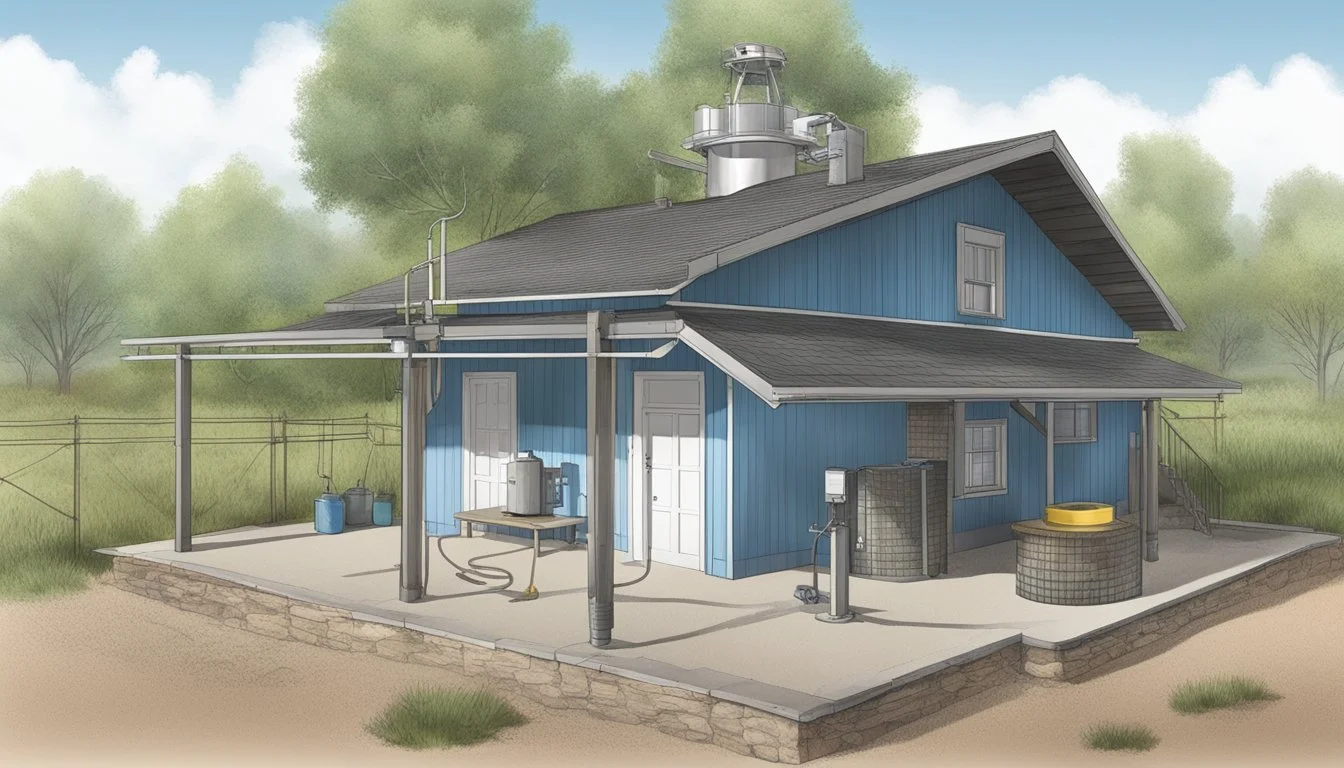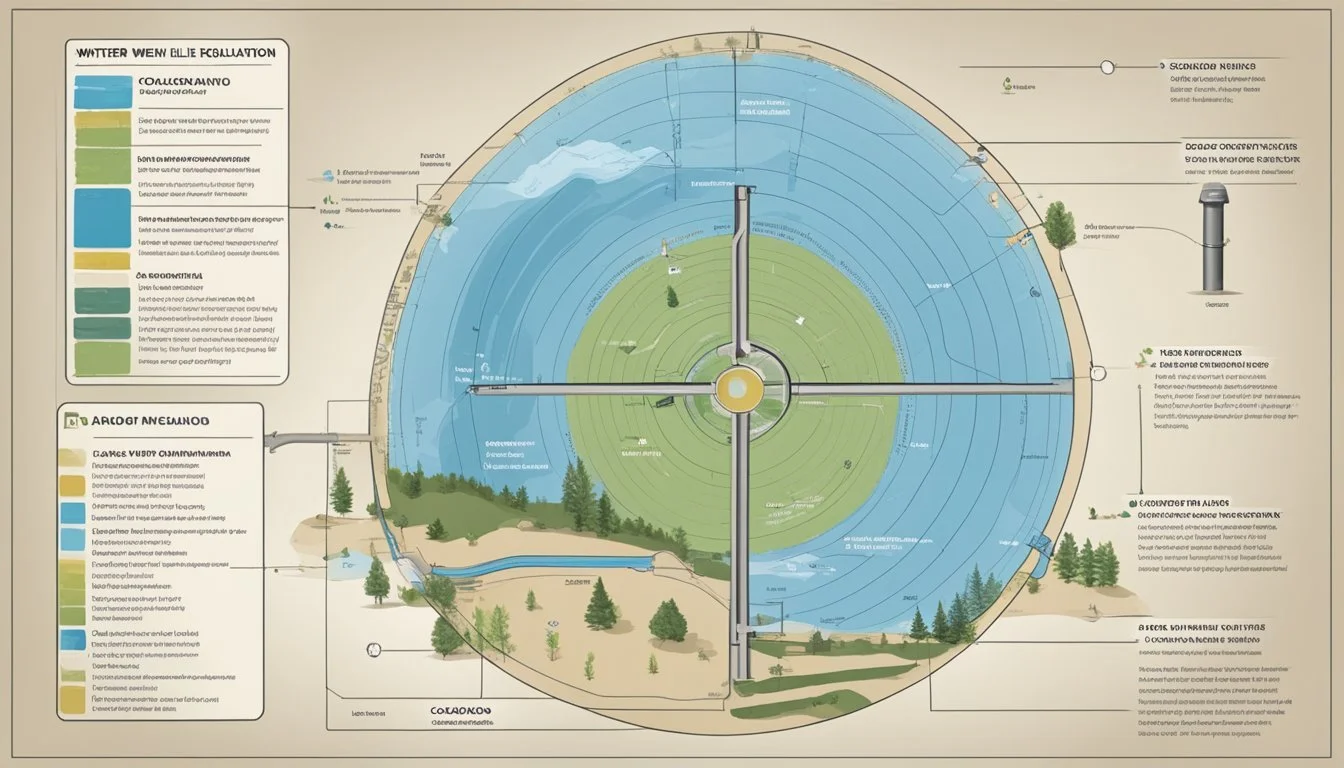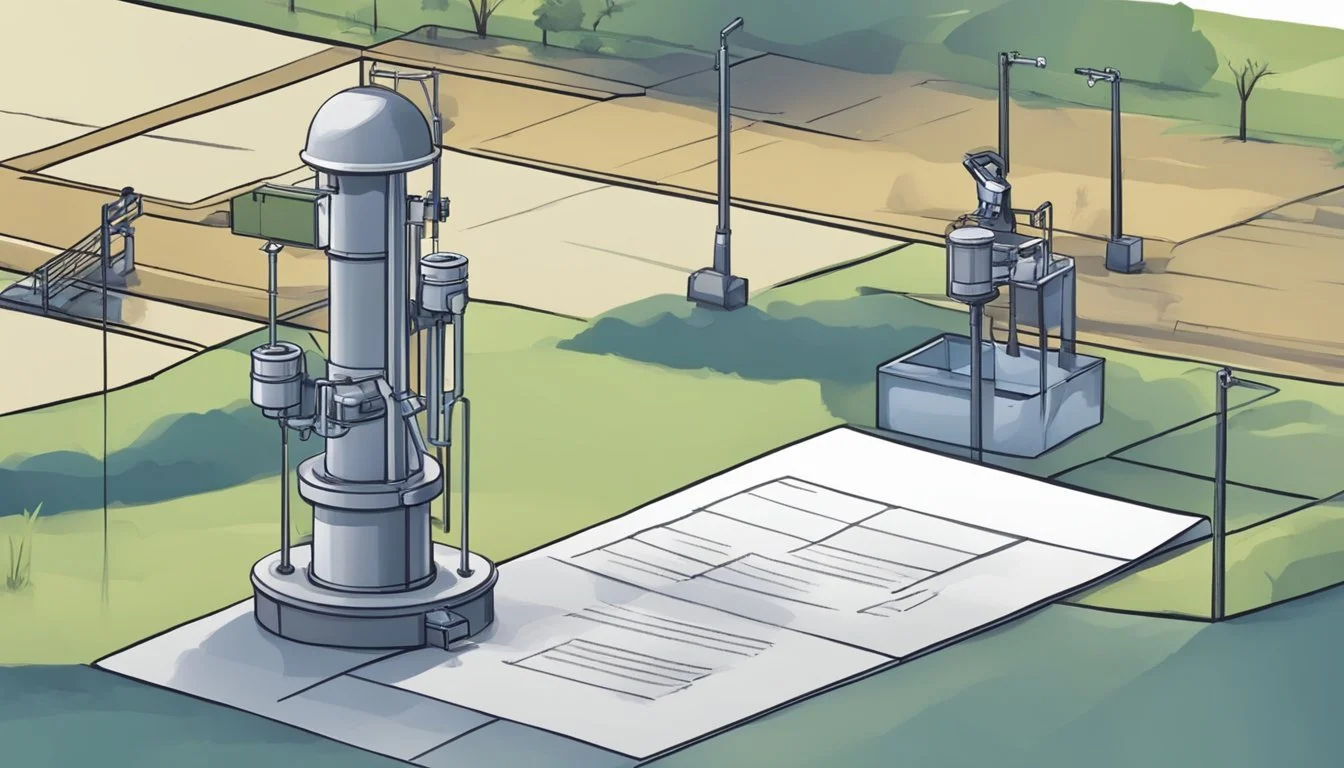Colorado Water Well Regulations
Understanding Compliance for Property Owners
In the state of Colorado, water resources are managed with careful consideration to ensure sustainability and legal compliance. The regulations surrounding well permitting and water rights are essential for maintaining the balance between human needs and environmental conservation. These laws are administrated by the Division of Water Resources, which provides comprehensive guidelines and procedures for obtaining well permits in different areas, including the Denver Basin and Designated Basins. The regulations aim to safeguard both the quality and quantity of water available to Coloradans now and in the future.
Colorado's approach to water well construction and inspection is just as rigorous. Prospective well owners must navigate a set of rules detailed by the Division of Water Resources to ensure that construction and operation practices meet the necessary safety and environmental standards. With the state's semi-arid climate, these measures are critical in preventing over-extraction and contamination of groundwater.
For private well owners, understanding the implications of these regulations is important, as the state does not regulate the water quality of private wells in the same way public water systems are. Instead, the Department of Public Health & Environment offers guidance and information on testing water quality, while permits and water usage are controlled by the Division of Water Resources. Compliance with these rules is vital for legal water usage and helps assure water availability for future generations in Colorado.
Regulatory Framework
The regulatory framework governing water wells in Colorado is rooted in a complex set of laws and institutions that balance public health, water rights, and environmental management. This section outlines the state's legal structure, the responsibilities of key regulatory bodies, and the management of designated groundwater basins.
Colorado Water Law and the Prior Appropriation System
Colorado water law operates under the prior appropriation system, also known as "first in time, first in right." This doctrine grants water rights based on the chronological order of water claims; earlier claimants (senior water rights holders) have priority over later claimants (junior water rights holders) during times of scarcity. The General Assembly enacts legislation affecting water laws, which are then adjudicated by the Water Court. These laws adhere to both public health needs and interstate compacts that Colorado has agreed upon with neighboring states.
Role of the Colorado Division of Water Resources
The Colorado Division of Water Resources (DWR), headed by the State Engineer and an integral part of the Office of the State Engineer, enforces the state's water laws. It oversees water right administration and ensures compliance with established rules and regulations. The DWR conducts well construction and inspection, issues well permits, and administers water rights according to the priority system. In addition, it supervises dams for safety, manages stream flow and water use data, and represents Colorado in interstate water compact negotiations.
Designated Ground Water Basins and Management
Designated Ground Water Basins in Colorado are regions where groundwater has limited connection to surface water and is managed separately. Water extraction here is overseen by the Colorado Ground Water Commission and is subject to ground water management districts within the basins. Specific use and measurement rules are tailored to these unique environments to ensure sustainable use and to protect existing water rights. These specialized regulations are a response to the unique hydrological conditions of designated basins and are fundamental to maintaining Colorado's overall water resources.
Permit Application and Approval Process
Securing a well permit in Colorado is an essential legal step before constructing a new well or modifying an existing one. This process ensures the responsible management of the state's water resources.
Applying for a Well Permit
Individuals or entities seeking to construct or modify a well must first submit a well permit application to the Division of Water Resources. The application must detail the proposed site of the well and the intended source of water. Accurate site information and a clear indication of the water source are crucial for a valid application.
Review by the State Engineer's Office
Upon receiving the application, the State Engineer's Office meticulously reviews the proposed well construction details. This review takes into account factors from the well's location to its potential impact on the local water supply. The State Engineer ensures that all aspects of the application comply with Colorado's water laws and regulations.
Permit Issuance and Operating Conditions
If the application meets all requirements, the State Engineer issues a well permit. The permit number is assigned, reflecting the official authorization for well construction. It stipulates specific operating conditions related to the quantity and use of the water extracted, and ongoing reporting to regulatory bodies is often mandatory. Permit holders must comply with these conditions to maintain the validity of their permits.
Water Well Construction and Standards
In Colorado, the parameters for water well construction are set forth with precise standards to ensure public health and environmental integrity. These regulations are enforced through rigorous requirements and the oversight of licensed contractors.
Well Construction Requirements
The Division of Water Resources in Colorado mandates strict well construction requirements to safeguard groundwater from contamination. All water wells must comply with established minimum construction standards to prevent any detrimental impact on water quality. Specifically, construction must adhere to the rules set out by the Board of Examiners which oversee the proper implementation of these standards.
For designated groundwater, particular attention is on maintaining the aquifer's integrity, enforcing the use of appropriate materials and well metering to manage and monitor water extraction. The design must ensure that the construction avoids any potential for aquifer cross-contamination.
Contractor Licensing and Oversight
Contractors performing well construction and pump installation are required to hold valid licenses issued by the Board of Examiners of Water Well Construction and Pump Installation Contractors. This ensures that only qualified personnel handle the critical task of constructing and maintaining water wells in Colorado. The Board of Examiners enforces compliance with state regulations, and any violation can result in disciplinary action, maintaining a high standard of professionalism and accountability in the industry.
Pump Installation and Maintenance
In Colorado, stringent requirements are set for both the installation of water well pumps and the subsequent maintenance. Contractors must adhere to a specific set of standards to ensure that water wells function safely and efficiently.
Pump Installation Contractor Requirements
License Requirements: Contractors in Colorado must have valid licenses for pump installation. These licenses affirm that the contractor has met the necessary qualifications and is equipped to perform the work according to state standards. Training and proficiencies are assessed regularly to assure the quality of pump installation services.
Documentation: Detailed records of each pump installation must be maintained, outlining the specifications of the work carried out and the materials used.
Maintenance and Inspection Standards
Regular Inspection: Maintenance of well water systems requires regular inspections to prevent issues and prolong the lifespan of the water well. Inspections ensure that pumps operate efficiently and are crucial for early detection of potential problems.
Maintenance Schedules:
Annual Checks: Recommended at least once a year for performance assessment.
Component Replacement: Necessary parts should be replaced as per the manufacturer's guidelines or when wear and tear are evident.
Professional Oversight: Pump installation and maintenance must be conducted under the guidance of licensed professionals. Their expertise is crucial in maintaining the integrity of the well water systems. Proper installation and maintenance not only ensure the reliable supply of water but also adherence to environmental and public health regulations.
Water Use and Conservation
Water management in Colorado revolves around the sustainable use and preservation of the state's water resources. Water rights and supply considerations play a critical role in ensuring that both surface and groundwater meet current needs while conserving for future generations.
Water Allocation and Use Regulations
In Colorado, water rights operate on the "first in time, first in right" doctrine, meaning senior water rights have priority over junior rights. This system regulates the allocation of water to various users, ensuring legal entitlement and equitable distribution of water resources. The Division of Water Resources provides well permitting to guide the construction of new wells, replacement wells, or the registration of existing ones, which is fundamental for controlling ground water usage. Moreover, augmentation plans can be mandated to compensate for the depletion of water from the natural stream flow, allowing for flexibility within water rights while protecting senior water users.
Conservation practices are essential for drought management. They involve implementing strategies such as water-efficient landscaping, regulated agricultural irrigation, and the integration of water reuse standards set by the Department of Public Health and Environment. Notably, Colorado has adopted a new water reuse rule that is pioneering in the nation, which mandates high treatment and testing standards for water providers utilizing direct potable reuse. This reflects the state's initiative to augment water supplies with stringent safety measures.
Conservation Practices and Drought Management
Conservation practices play a pivotal role in managing Colorado's water supply, particularly during periods of drought. Residents and businesses are encouraged to employ water-saving techniques, with the state supporting development and use of conservation plans. The groundwater program under the Department of Public Health & Environment demonstrates commitment to sustaining natural resources by administering water rights and monitoring water usage.
Active drought management involves a proactive approach where the state constantly assesses water supply levels and implements appropriate restrictions to mitigate the impact of shortages. These measures are critical in safeguarding the water supply for both the present and future, balancing the demands on water resources across various sectors. Effective drought management strategies are essential for the state's resilience against the backdrop of fluctuating climatic conditions and natural water availability.
Compliance and Enforcement
Compliance with Colorado's water regulations ensures the proper use and management of the state's water resources. Enforcement actions are taken to maintain the integrity of the water rights system, safeguarding both the environment and stakeholders involved.
Monitoring and Reporting
Under the stewardship of the Division of Water Resources, well owners in Colorado are required to adhere to specific Measurement Rules. Monitoring of wells includes consistent reporting of water use, which is essential in managing the state's water resources effectively. This adherence is crucial for compliance with state rules and regulations and helps in the equitable distribution of water according to the Prior Appropriation Doctrine.
Enforcement Actions and Penalties
When a well owner fails to comply with the established regulations, the State Engineer may take enforcement actions. These actions can range from issuing notices to administering penalties. In more severe cases, noncompliant parties may face a formal hearing before a hearing officer, where further penalties or corrective measures can be determined. The Division of Water Resources also facilitates stakeholder meetings to discuss compliance issues and develop solutions that align with legal and environmental standards.
Public Involvement and Information
Public involvement is crucial in the regulation of water wells in Colorado. The state ensures that current information and notifications about water resources are accessible and that stakeholder meetings and public hearings are conducted for transparency and community engagement.
Stakeholder Meetings and Public Hearings
The Colorado Division of Water Resources conducts stakeholder meetings to engage the public and gather input on water well regulations. These meetings ensure that diverse viewpoints are considered in the decision-making process. They regularly schedule public hearings on various topics related to water rights and well permitting, allowing for direct community involvement and ensuring that the concerns of the public, including public health considerations, are addressed.
Upcoming Meetings: View schedules and agenda of stakeholder meetings and hearings.
Past Hearings: Search and review past meeting records to stay informed.
Access to Records and Notification Lists
For those interested in staying informed, the Colorado Division of Water Resources maintains comprehensive records that the public can access. These documents include permit applications, well inspections, and water use reports, contributing to a transparent regulatory environment.
Records Search: Individuals can search records to view water well permits and related documentation.
Notification Lists: You can join notification lists to receive updated information and alerts about water well regulations and public health concerns pertaining to Colorado's water resources.
Note: Public access to these records and lists ensures ongoing community awareness and involvement in water resource management.
Special Considerations for Specific Areas
In Colorado, water well regulations vary significantly by location, particularly in designated basins and areas with specific oversight, such as the Denver Basin or local districts. Understanding these distinctions is vital for compliance with state laws and responsible water management.
Denver Basin and Special Districts
The Denver Basin is a geologically defined area with unique groundwater rules. The Colorado Division of Water Resources provides detailed guidance on well permitting specific to this region, including special use and measurement rules that may apply. For instance, in certain groundwater basins and river basins, specific local districts dictate the extent to which water can be drawn, requiring residents and businesses to adhere to tailored guidelines that reflect the unique characteristics of the local aquifers and water demand.
Exempt and Domestic Wells
Certain wells, classified as exempt wells, may not be subject to the same stringent permitting requirements as others. These exempt wells are typically used for household purposes, livestock watering, or irrigation of small gardens, and they are commonly found in rural or semi-rural regions outside of municipal water supply systems. In contrast, domestic wells require a permit, and users must understand the limitations and regulations concerning their use. These regulations can affect numerous aspects from the site location to the volume and purpose of water extraction, aiming to manage the region's water resources effectively.
Further Resources and Education
For individuals seeking to navigate well permitting or to enhance their professional knowledge in water well regulations within Colorado, a wealth of resources and educational materials are readily available. These resources are designed to inform and educate about state-specific water laws and regulatory procedures.
Educational Materials from Colorado State University
Colorado State University provides a repository of educational materials for homeowners and professionals looking to understand the nuances of Colorado water wells. The information ranges from water rights and well permits to the technical aspects of well construction and maintenance. One can seek guidance on water administration through their Private Wells for Home Use guide which delves into administrative bodies like the Colorado Ground Water Commission.
Professional Development and Industry Resources
For ongoing professional development, the Division of Water Resources (DWR) offers a comprehensive look at well construction and inspection processes, and they keep the industry abreast of regulatory changes through Well Construction & Inspection guidelines. Additionally, industry professionals can stay informed about rulemaking, best practices, and standards through resources like the National Ground Water Association and the Water Well Construction Rules provided by the DWR.
Frequently Asked Questions
In this section, readers will find concise answers to common inquiries regarding the regulations and procedures for well permits in Colorado.
How many acres are required to obtain a well permit in Colorado?
In Colorado, the acreage required for a well permit varies by the type of use. For example, a residential or household use well typically does not require a specific acreage.
What are the necessary steps to apply for a well permit in Colorado?
To apply for a well permit in Colorado, one must submit an application to the Division of Water Resources, provide details of the proposed well location and use, and pay the necessary fees.
What distinguishes a domestic well from a household well in Colorado?
A domestic well in Colorado is permitted for use on up to 35 acres or for more than one single-family dwelling, while a household well is restricted to use within a single-family dwelling.
What is the typical depth of residential wells in Colorado?
The depth of residential wells in Colorado can vary widely, but they typically range from 100 to 600 feet, depending on local groundwater levels and geology.
How can I search for existing well permits in Colorado?
One may search for existing well permits in Colorado using the Division of Water Resources' online database, which provides details on permit status, well depth, and location.
What is the cost associated with obtaining a well permit in Colorado?
The cost to obtain a well permit in Colorado includes the application fee, which varies depending on the type of permit and the complexity of the water rights associated with the well.








